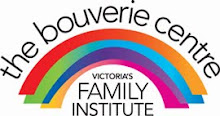A central argument made against same-sex marriage is that children born into these marriages will be disadvantaged: they will grow up with inappropriate gender role modelling, be bullied at school and suffer poorer emotional well-being than their peers.
Same-sex
attracted people may come to parenthood in many ways – though
former heterosexual relationships, as a foster parent or a step parent.
Increasingly, lesbian couples and single women are forming families using known
sperm donors (a friend of the couple) or a clinic-sourced anonymous donor. Male
couples are also increasingly turning to egg donation and surrogacy services to
become parents.
The 2011 Australian Census counted 33,714 same-sex
couples. Around 4,000 of these couples had dependent children living with them.
But this is likely to be an under-representation, as not all same-sex attracted
people declare their relationship in the census and single parents who identify
as same-sex attracted would not be identified.
In the United States, of the 594,000 same-sex couple
households in 2011, 115,000 reported having children.
People
may not agree with gay marriage on moral or religious grounds. But the argument
that it harms children does not stack up against current evidence.
In 2010,
American researchers published results from a meta-analysis of 33 studies
comparing the well-being of children raised by opposite-sex couples with
children raised by same-sex couples. This study found no evidence that children
raised by same-sex parents fared any worse than other children on a range of
behavioural, educational, emotional or social outcomes.
The
researchers also concluded there was no evidence that children raised by a
single parent or same-sex couples were less competent or well-rounded than
other children. If anything, studies of single-parent families show these men
and women are more flexible in their parenting styles than they are given
credit for. Men are capable of gentle, nurturing parenting. Women are capable
of setting rules and boundaries for children, while also teaching them
football.
What about donor-conceived children?
Political
concerns about lesbians’ access to fertility services means the
well-being of donor-conceived children has entered debates about same-sex
marriage and parenting.
In 2013,
the story of Narelle Grech, a young Australian woman
who had been diagnosed with terminal cancer, hit the news media. Grech was
donor-conceived and desperately wanted to meet her biological father before she
died.
Grech’s
story made a powerful statement about the importance of donor-conceived
children having the option to know their genetic heritage. But media reports
often gave the impression that every donor-conceived child was searching sadly
for their genetic parent.
This is not the case. Some donor-conceived children are
highly driven to meet donor parents, some are curious and others aren’t
interested. There is no evidence that donor-conception causes children
emotional or social damage.
Do children get teased at school?
A 2008 study by the Gay, Lesbian, Straight
Education Network (GLSEN) in the United States found many children raised by
same-sex parents had experienced or witnessed some form of homophobic
harassment at school.
But more
commonly, young people reported feeling excluded or isolated because schools
did not acknowledge their family makeup. In some cases, staff actively
discouraged students from speaking about their families due to a misguided
concern that this amounted to talking about sex or sexuality in the classroom.
Other
studies have found more mixed results.
Australian
research has shown that some children worry they will experience
homophobic discrimination and this anxiety may affect their well-being. But most children with same-sex parents do not
encounter more frequent or intense schoolyard bullying than other children.
Additionally,
children with same-sex parents generally have good social networks and peer
relationships, which are a strong buffer against stigma or discrimination.
Is this research reliable?
Studies
on the well-being of children raised by same-sex parents have been criticised because most rely on small “convenience” samples. Critics argue convenience
sampling is inherently unreliable because people who are healthy and
resourceful are more likely to opt in to studies than those who are socially
disconnected or less capable.
However,
large population-based studies tend to include only a small sub-sample of
children raised by same-sex parents. This doesn’t generate the numbers needed
for reliable statistical analysis.
Methodological
limitations provide fuel for conservative arguments against the validity of
these studies. What critics do not acknowledge is that repetition of findings – numerous studies
conducted over time and in various locations, all which show children with
same-sex parents are doing well – is a major strength of this body of research.
What about same-sex marriage?
Children
raised by same-sex parents do
better when they are living in a city or country that is more
socially progressive and accepting of homosexuality. As such, openly supporting
the rights of same-sex couples is one of the best things governments can do to
support children being raised by same-sex parents.
Beyond
this, funding programs such as the Safe-Schools
coalition Australia, which seeks to ensure schools are well-equipped
to address homophobia, will have a direct impact on the day-to-day experiences
of children with same-sex parents.
Check out The Conversation


.jpg)



No comments:
Post a Comment